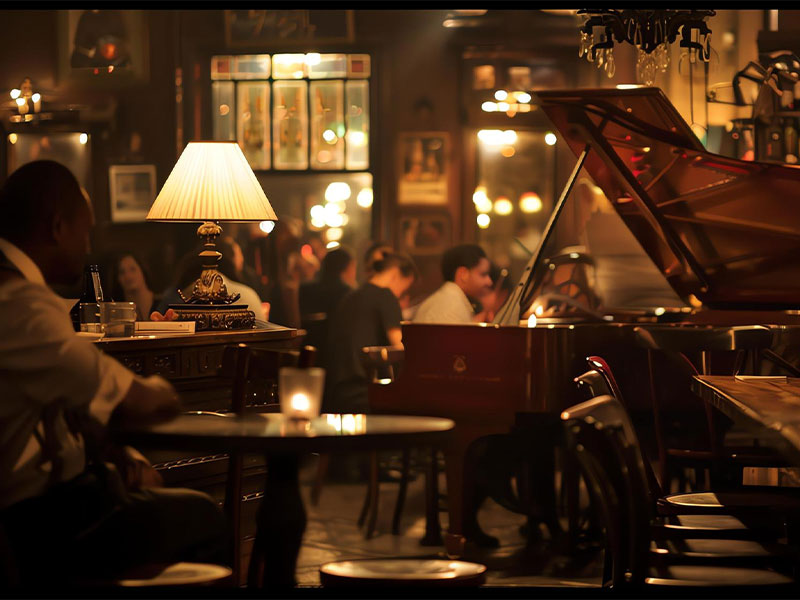
At first glance, it may not seem
like music can affect a restaurant’s sales. However, you should know that the
impact of playing music in a restaurant is so significant that it can turn a
dining spot into a well-known place and help establish its brand identity. On
the other hand, to play music effectively, you need to consider purchasing
professional restaurant equipment to achieve your goals.
So, stay with us as we share
insights into the influence of music in restaurants.
How Does Playing
Music Affect a Restaurant?
Creating a Pleasant Atmosphere
Music is a key element in setting
the mood. The right harmony helps ensure that your brand stays in customers’
minds and aligns seamlessly with your décor. The volume is also crucial;
studies show that if the music is too loud, guests cannot converse properly or
even enjoy their meals. Conversely, playing music at an extremely low volume or
not playing any music at all has its drawbacks. In public spaces, music plays
an essential role in creating a personal and private ambiance around guests,
allowing them to converse without being overly conscious of other staff or
patrons.
Enhancing Customer Experience
Music evokes emotions, and its
impact on the overall customer experience should not be underestimated. For
most customers, background music enhances their dining pleasure, improves the
atmosphere, encourages relaxation, and can even stimulate conversation.
Investing in a quality sound system for your café or restaurant is a worthwhile
expense that ultimately benefits you.
Boosting Employee Morale
Beyond affecting customers, music
also has a significant influence on employees. Research has shown that playing
music in the workplace can improve employee performance, increase job
satisfaction, and reduce absenteeism. However, repetitive or inappropriate
music can have the opposite effect and become tiresome.
When the right music is played,
employees tend to be more productive, provide better service, and even stay in
their jobs longer. This leads to happier customers, more frequent visits, and
increased restaurant profits.
Strengthening Brand Identity
Restaurant owners must carefully
select the types of music played in their establishments to create a consistent
brand image. Just like a logo or interior design, background music reflects a
brand’s values and personality. Over time, maintaining a consistent music genre
fosters a sense of familiarity among customers and encourages repeat visits.
Playing the wrong or inappropriate
music can decrease overall sales by up to 4%. On the other hand, choosing the
right music can increase sales by 5%. If the music style or genre does not
match customers' preferences, simply playing any music may have negative
effects. Before selecting a playlist, restaurant owners should consider their
target demographic, including age, income level, and musical preferences.
The Impact of Music on Food Taste
The music you play can actually
enhance the taste of your food. Scientists have been studying the impact of
music on flavor perception for years and have discovered that playing soft
sounds while dining enhances the taste of well-prepared dishes. Conversely,
higher-pitched notes amplify sweet flavors. If the background music is too
loud, it disrupts the sense of taste, making food and drinks less enjoyable.
Reducing the Sense of Waiting Time
Scientific research suggests that
music can help reduce stress for those waiting in line. When soft and pleasant
music is played in the background, customers feel less anxious about waiting.
If you run a busy café, make sure to start the day with soothing and slow-tempo
music to create a relaxed and enjoyable atmosphere for guests waiting for their
morning coffee.
Increasing Revenue
People use music as a powerful cue
to interpret a place, and smart restaurateurs can use this to boost their
sales. Studies indicate that restaurants playing classical music are perceived
as more elegant and, as a result, more expensive than those playing pop music.
You can use this to your advantage—if you run a casual eatery, playing pop
music may be suitable. However, if you manage a fine dining restaurant,
instrumental or classical music can attract a more sophisticated clientele.
Conclusion
Ultimately, music plays a crucial role
in shaping the customer experience, increasing sales, boosting employee morale,
and establishing brand identity in restaurants. The right choice of music can
transform an ordinary restaurant into a favorite destination. If you own a
restaurant, café, or eatery, paying attention to your music selection can be a
game-changer for your success. Choobni recommends that, along with
interior design and food quality, you also focus on selecting the right music
and sound system to create a captivating and memorable atmosphere for your
customers.
Frequently Asked
Questions About the Impact of Music in Restaurants
Why is choosing the right music important for a restaurant?
Selecting the right music can
influence customer experience, sales, brand identity, and even staff morale.
Music that matches the restaurant's atmosphere can encourage customers to stay
longer and enhance their overall satisfaction.
What type of music is best for a restaurant?
The choice of music depends on the
type of restaurant and its target customers. Fine dining restaurants may
benefit from classical or instrumental music, while modern cafés can opt for
jazz, light, or pop music. The key is to ensure the music complements the
restaurant’s ambiance.
Does the volume of music in a restaurant matter?
Yes, the volume should not be too
loud, making it difficult for customers to converse, nor too low, rendering it
ineffective. Studies show that a balanced volume enhances customer experience
and can even boost sales.


Comments 0